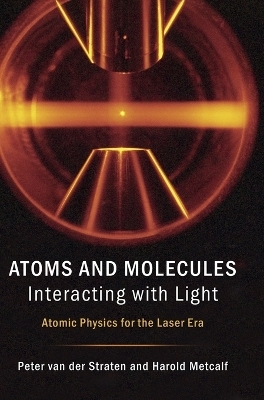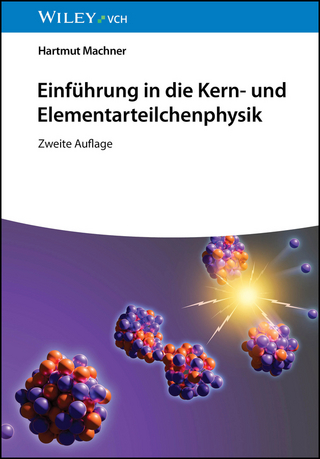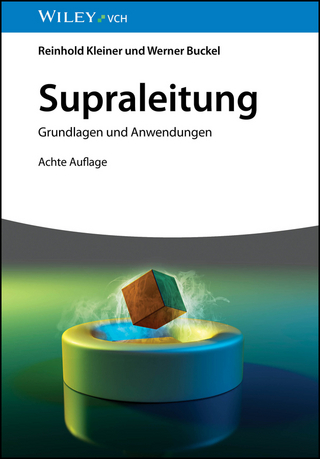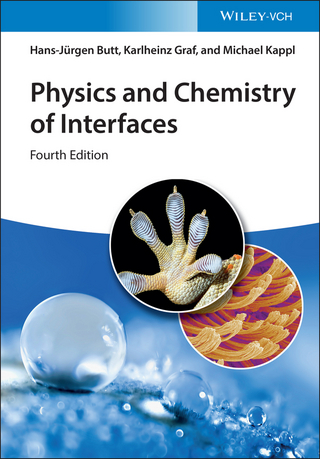
Atoms and Molecules Interacting with Light
Cambridge University Press (Verlag)
978-1-107-09014-9 (ISBN)
This in-depth textbook with a focus on atom-light interactions prepares students for research in a fast-growing and dynamic field. Intended to accompany the laser-induced revolution in atomic physics, it is a comprehensive text for the emerging era in atomic, molecular and optical science. Utilising an intuitive and physical approach, the text describes two-level atom transitions, including appendices on Ramsey spectroscopy, adiabatic rapid passage and entanglement. With a unique focus on optical interactions, the authors present multi-level atomic transitions with dipole selection rules, and M1/E2 and multiphoton transitions. Conventional structure topics are discussed in some detail, beginning with the hydrogen atom and these are interspersed with material rarely found in textbooks such as intuitive descriptions of quantum defects. The final chapters examine modern applications and include many references to current research literature. The numerous exercises and multiple appendices throughout enable advanced undergraduate and graduate students to balance theory with experiment.
Peter van der Straten is Professor of Nanophotonics at Utrecht University where his research interests focus on Bose–Einstein condensation and quantum hydrodynamics. He is head of the Teaching Advisory Committee of the Physics Department and a member of the Dutch Physical Society. Harold Metcalf is Distinguished Teaching Professor at Stony Brook University. He has been awarded the Humboldt Prize in recognition of his contribution to atomic physics and has received numerous awards for excellence in teaching.
Part I. Atom-Light Interaction: 1. The classical physics pathway; Appendix 1A. Damping force on an accelerating charge; Appendix 1B. Hanle effect; Appendix 1C. Optical tweezers; 2. Interaction of two-level atoms and light; Appendix 2A. Pauli matrices for motion of the bloch vector; Appendix 2B. The Ramsey method; Appendix 2C. Echoes and interferometry; Appendix 2D. Adiabatic rapid passage; Appendix 2E Superposition and entanglement; 3. The atom-light interaction; Appendix 3A. Proof of the oscillator strength theorem; Appendix 3B. Electromagnetic fields; Appendix 3C. The dipole approximation; Appendix 3D. Time resolved fluorescence from multi-level atoms; 4. 'Forbidden' transitions; Appendix 4A. Higher order approximations; 5. Spontaneous emission; Appendix 5A. The quantum mechanical harmonic oscillator; Appendix 5B. Field quantization; Appendix 5C. Alternative theories to QED; 6. The density matrix; Appendix 6A. The Liouville–von Neumann equation; Part II. Internal Structure: 7. The hydrogen atom; Appendix 7A. Center-of-mass motion; Appendix 7B. Coordinate systems; Appendix 7C. Commuting operators; Appendix 7D. Matrix elements of the radial wavefunctions; 8. Fine structure; Appendix 8A. The Sommerfeld fine-structure constant; Appendix 8B. Measurements of the fine structure 9. Effects of the nucleus; Appendix 9A. Interacting magnetic dipoles; Appendix 9B. Hyperfine structure for two spin =2 particles; Appendix 9C. The hydrogen maser; 10. The alkali-metal atoms; Appendix 10A. Quantum defects for the alkalis; Appendix 10B. Numerov method; 11. Atoms in magnetic fields; Appendix 11A. The ground state of atomic hydrogen; Appendix 11B. Positronium; Appendix 11C. The non-crossing theorem; Appendix 11D. Passage through an anticrossing: Landau–Zener transitions; 12. Atoms in electric fields; 13. Rydberg atoms; 14. The helium atom; Appendix 14A. Variational calculations; Appendix 14B. Detail on the variational calculations of the ground state; 15. The periodic system of the elements; Appendix 15A. Paramagnetism; Appendix 15B. The color of gold; 16. Molecules; Appendix 16A. Morse potential; 17. Binding in the hydrogen molecule; Appendix 17A. Confocal elliptical coordinates; Appendix 17B. One-electron two-center integrals; Appendix 17C. Electron-electron interaction in molecular hydrogen; 18. Ultra-cold chemistry; Part III. Applications: 19. Optical forces and laser cooling; 20. Confinement of neutral atoms; 21. Bose–Einstein condensation; Appendix 21A. Distribution functions; Appendix 21B. Density of states; 22. Cold molecules; 23. Three level systems; Appendix 23A. General case for _1 , _2; 24. Fundamental physics; Part IV. Appendices: Appendix A. Notation and definitions; Appendix B. Units and notation; Appendix C. Angular momentum in quantum mechanics; Appendix D. Transition strengths; References; Index.
| Erscheint lt. Verlag | 4.2.2016 |
|---|---|
| Zusatzinfo | 31 Tables, black and white; 22 Halftones, black and white; 138 Line drawings, black and white |
| Verlagsort | Cambridge |
| Sprache | englisch |
| Maße | 180 x 253 mm |
| Gewicht | 1180 g |
| Themenwelt | Naturwissenschaften ► Physik / Astronomie ► Atom- / Kern- / Molekularphysik |
| Naturwissenschaften ► Physik / Astronomie ► Optik | |
| ISBN-10 | 1-107-09014-8 / 1107090148 |
| ISBN-13 | 978-1-107-09014-9 / 9781107090149 |
| Zustand | Neuware |
| Informationen gemäß Produktsicherheitsverordnung (GPSR) | |
| Haben Sie eine Frage zum Produkt? |
aus dem Bereich


